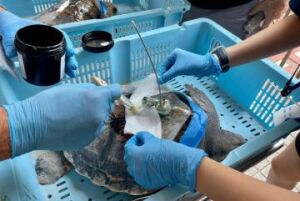24 Sep Fieldwork Makes the Dream Work
 Wildlife Computers is always looking for ways to better serve customers—and that means getting out of the office and into the field. This June, Rowan Calder, one of our technical sales consultants, traveled to the Port of Nagoya Public Aquarium in Japan. The aquarium is a key stakeholder in the groundbreaking STRETCH, Sea Turtle Research Experiment on the Thermal Corridor Hypothesis program. This initiative aims to test a hypothesis about the movements of endangered juvenile loggerhead turtles hatched in Japan across the North Pacific Ocean to Baja, California. You can read their latest publication here. For the last three years, Rowan has worked closely with the aquarium team and its partners from Stanford, Kochi University, and Hawaii Preparatory Academy, to prep, program, attach and deploy, a total of 86 turtle tags over three consecutive years.
Wildlife Computers is always looking for ways to better serve customers—and that means getting out of the office and into the field. This June, Rowan Calder, one of our technical sales consultants, traveled to the Port of Nagoya Public Aquarium in Japan. The aquarium is a key stakeholder in the groundbreaking STRETCH, Sea Turtle Research Experiment on the Thermal Corridor Hypothesis program. This initiative aims to test a hypothesis about the movements of endangered juvenile loggerhead turtles hatched in Japan across the North Pacific Ocean to Baja, California. You can read their latest publication here. For the last three years, Rowan has worked closely with the aquarium team and its partners from Stanford, Kochi University, and Hawaii Preparatory Academy, to prep, program, attach and deploy, a total of 86 turtle tags over three consecutive years.
During this year’s event, Rowan conducted a field trial of our next generation turtle tag—SPOT-433. This tag, available later this year, will weigh around 7 grams and utilize solar power. Five turtles were double-tagged with both our SPOT and SPLASH tags. This was the first field trial of the SPOT-433, ensuring its deployment readiness.
Why are these field trials important?
- Juvenile turtles present unique challenges due to their size and delicate shells. By perfecting attachment methods and programming protocols, we can fine-tune any issues and ensure each tag fits without hindering the turtles.
- Rowan was able to gather real-time information from the biologists and technicians as the attachment and deployment happened live.
- Prototype deployments on live animals allow for the study of actual animal behaviors, migrations, and interactions with their habitat. They also reveal practical challenges or unexpected problems with durability, attachment, or data transmission reliability.
Every tag we test in the field brings us one step closer to understanding—and protecting—our planet’s most vulnerable species. At Wildlife Computers, we believe that innovation happens at the intersection of technology and nature. Look for updates as we continue to refine our tags and support global research initiatives.
